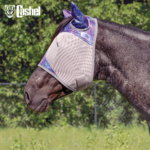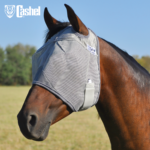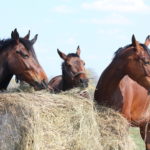Horse owners often ask equine nutritionist Dr. Juliet Getty about the safety of offering common?and sometimes not so common?foods as treats. Carrots have naturally come up in discussion, but also French fries, garlic bread, and even chocolate. What’s safe and what’s not, and under what circumstances, may surprise anyone who has ever extended a chunk of apple to an eager horse.

Dr. Getty points out that some treats are generally safe, some treats are sometimes safe, and some are never, ever good for horses. As she points out, ?Horses trust humans for their care. Choose wisely.?
Safe to feed, generally:
- Apples
- Apricots (without the pit)
- Bananas (including the peel)
- Beets
- Berries
- Carrots
- Celery
- Cherries
- Coconut
- Dates (pitted)
- Grapes (and raisins)
- Grapefruit
- Lettuce
- Lemons
- Limes
- Mango
- Melons
- Oranges
- Peaches
- Pears
- Peanuts (roasted, never raw)
- Pineapple
- Plums
- Squash
- Sweet potatoes
- Tangerines
- Watermelon (including the rind)
Avoid these foods for ALL horses, always:
- Chocolate. Like dogs, horses are sensitive to the toxic chemical theobromine found in chocolate.
- Milk and milk products: Do not feed ice cream, cheese, and even yogurt. Grown horses are lactose intolerant. As Dr. Getty cautions, Your horse will get diarrhea and, she adds with a twinkle, he will not like you.
Other potentially toxic fruits and vegetables include:
- Broccoli
- Cauliflower
- Cabbage
- Tomatoes
- Peppers
- Raw potatoes
- Onions
- Garlic (raw)
- Spinach
- Avocados
Special Circumstances — Choices for horses with insulin resistance, Cushing’s or risk of laminitis: Starch and sugar are out of the question for some horses. Fat deposits along the crest of the neck, rump, shoulders, or back, indicate insulin resistance. Starchy or sugary treats will raise insulin to dangerous levels, increasing laminitis risk. Horses with Cushing’s disease also require a low starch/low sugar diet. Avoid these:
- Apples
- Bread
- Candy
- Carrots
- Cooked Potatoes
- Commercial treats made with cereal grains (oats, corn, barley, rice, wheat) and molasses
Better low sugar/low starch choices:
- Alfalfa cubes or pellets (surprisingly low in sugar)
- Apple peels
- Watermelon rinds
- Commercial products that are low in starch/sugar
Final Thought: Treats with something extra? Not worth feeding. Some commercial treats have added vitamins and minerals. There is a risk of either feeding too many nutrients if the horse already gets a fortified feed, or not feeding enough if the treats are meant as a nutritional supplement. Probiotics are added to some treats, but their microbial concentration is too low to make a difference, unless the horse was given the whole bag.
Dr. Getty has taught and consulted on equine nutrition for more than 20 years. Her website offers helpful articles, a nutrition forum and a calendar of her events, including upcoming and past teleseminars to purchase and download. Her comprehensive reference book, Feed Your Horse Like A Horse, is available in hardcover and CD-ROM (pdf file) through her website or at Amazon.com. Sign up for her useful free monthly e-newsletter ?Forage for Thought? through the website. Dr. Getty serves as a distinguished advisor to the Equine Sciences Academy, and she is also available for individual consultations. Reach Dr. Getty directly at gettyequinenutrition@gmail.com or (970) 884-7187.





